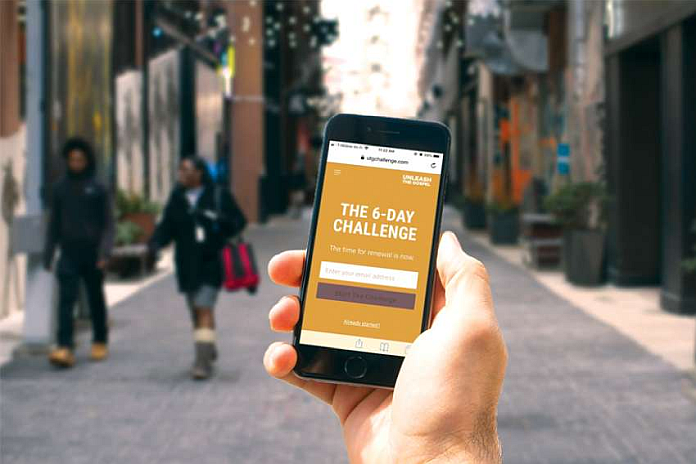By Quinton Amundson
CALGARY, Canada, (The Catholic Register) – Canadian millennials engage less in digital religion practices compared to their US counterparts, a new study authored by Sarah Wilkins-Laflamme, an associate professor of sociology and legal studies at the University of Waterloo, has found.
“Digital Religion Among US and Canadian Millennial Adults,” published in June’s Review of Religious Research, revealed that 67 per cent of the 1,508 surveyed Canadians – born from 1984 to 2001 – never post about “religious or spiritual beliefs, values, views or practices” on social media. Comparatively, 53 percent of the 1,006 American participants refrain from posting on social platforms.
Forty-one per cent of Canadians answered that they never “watched online content on religious or spiritual beliefs, values, ideas or practices” at least once per year compared to 36 per cent of US respondents.
All 2,514 millennials chosen for the study were identified and recruited through Canadian-owned market research and analytics company Leger. The 69-question survey was administered through the University of Waterloo’s Survey Research Centre in March 2019 – one year before the COVID-19 pandemic.
Lower levels of digital religion participation from Canadian millennials is a product of the secular transition that took root in Canada in the 1960s, decades before its neighbour to the south, explained Wilkins-Laflamme.
“There was the Quiet Revolution in Quebec on the French-speaking side. While Catholicism was strongly tied to national and regional identity before, that kind of broke off in the 1960s and is moving further and further away since,” she said.
“The same thing sort of happened in English Canada, even though you don’t hear about it as much. The pre-1960s kind of British, imperial identity that a lot of English-speaking Canadians had, it was in the 1960s when that dissipated with the fall of the British Empire and a shift towards a multiculturalism focus for our national identity.”
Wilkins-Laflamme said even today, “American identity is still strongly tied to Christianity,” but strides towards a secular transition have been made since the 1990s.
According to the study, 10 percent of US millennials consume religious digital content daily, and 11 per cent create a religious or spiritually focused social post at least once per day, doubling the five and four per cent of Canadians, respectively.
Americans also outpace Canadians in the frequency of weekly and monthly digital content consumption and social media posting. Fifteen per cent of Americans watch content weekly, and 16 per cent partake monthly, eclipsing 11 and 13 percent of Canadians. As for social media, Americans led with 11 and 10 percent, compared to Canada’s six and seven per cent.
However, Canadian millennials did equal to or better Americans aged 18-35 in the once-a-year and few-times-a-year categories.
Canadians outperform Americans in several times-per-year religious media consumption by six percentage points (22-16), and they eke out a one-point advantage in the once-per-annum grouping (8-7).
Americans and Canadians deadlock at six percent making a social post once every 365 days, and at 10 percent making several posts over a calendar year.
At the Toronto Catholic District School Board (TCDSB), efforts are being made within the classroom and through student leadership initiatives to empower youth to express their spirituality on their Facebook, Instagram and TikTok channels.
“We explore dialogue on this topic in the classroom, and we certainly ask our teachers to explore aspects of the curriculum through technology,” said Michael Caccamo, the superintendent of education for TCDSB. “That is inclusive of religion, family life and faith formation. Our teachers on a regular basis do activities that include sharing of ideas, thoughts and questions on social media posts.”
Caccamo, who also guides TCDSB’s Nurturing Our Catholic Community (NCC) team, is proud of a digital religion initiative staged by the Catholic Student Leadership Impact Team (CSLIT) during the school years impacted by the pandemic.
Student leaders across the board conceptualized Let’s Talk Faith, a series of webinars that invited students to tune in via a virtual platform to hear special faith-based speakers share their testimonial journey and impart religious guidance.
Young people who choose to view such videos, or opt to dabble in religion to various degrees, said Wilkins-Laflamme, are largely complementing and supplementing traditional forms of worship.
“I was maybe expecting a larger group of millennials who would only do digital religion, and what I found is there is a small minority who does that with no in-person activities. But for the most part, when you do digital religion, it is because you are interested in religion and are likely doing something spiritually in-person as well. It kind of makes sense in the end.”
“Digital Religion Among US and Canadian Millennial Adults” stated there “are only five per cent of young adult respondents who only do monthly or more frequent religious or spiritual digital content consumption without also attending religious services at least once a month or practising an unchurched spirituality at least once a month.”
As for social media, the millennial respondents who attend a religious service daily are “72 percent more likely to consume religious or spiritual digital content at least once a month” and boast a “55-per-cent probability of posting about religion or spirituality at least once a month.” This represents a vast difference to the 12 and nine per cent denoted by millennials who never attend Mass.





